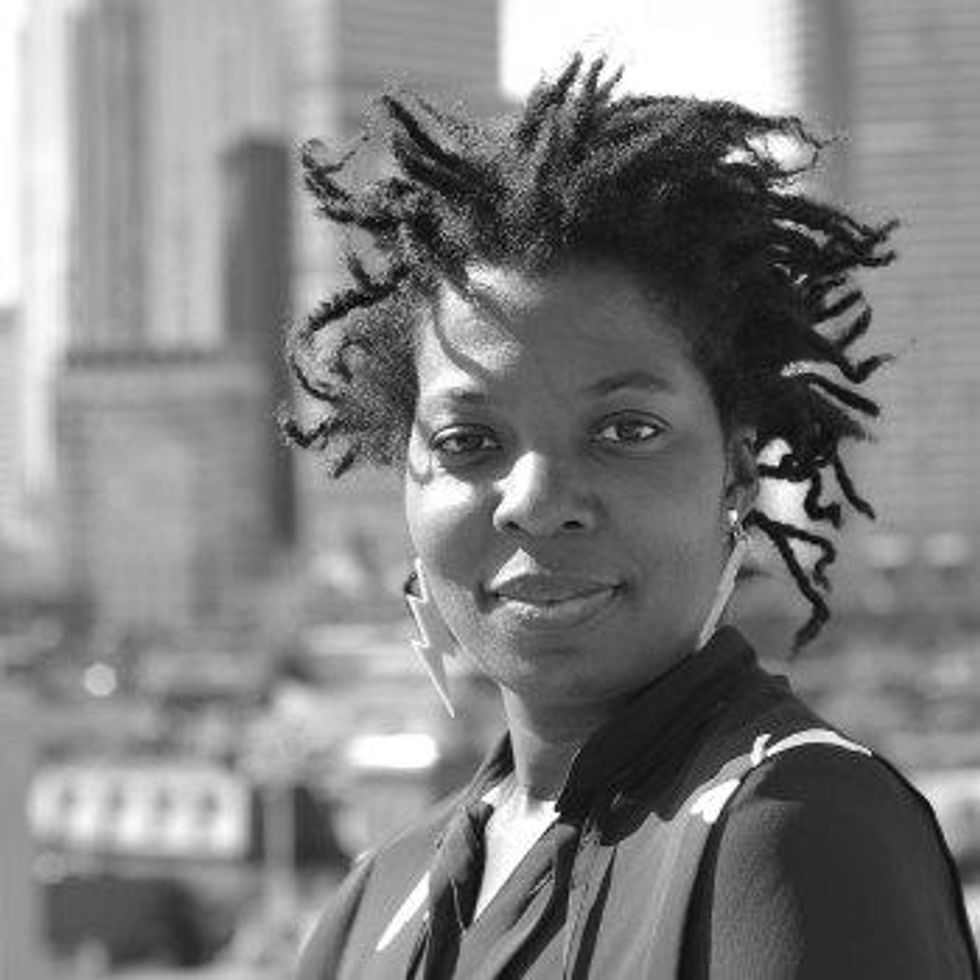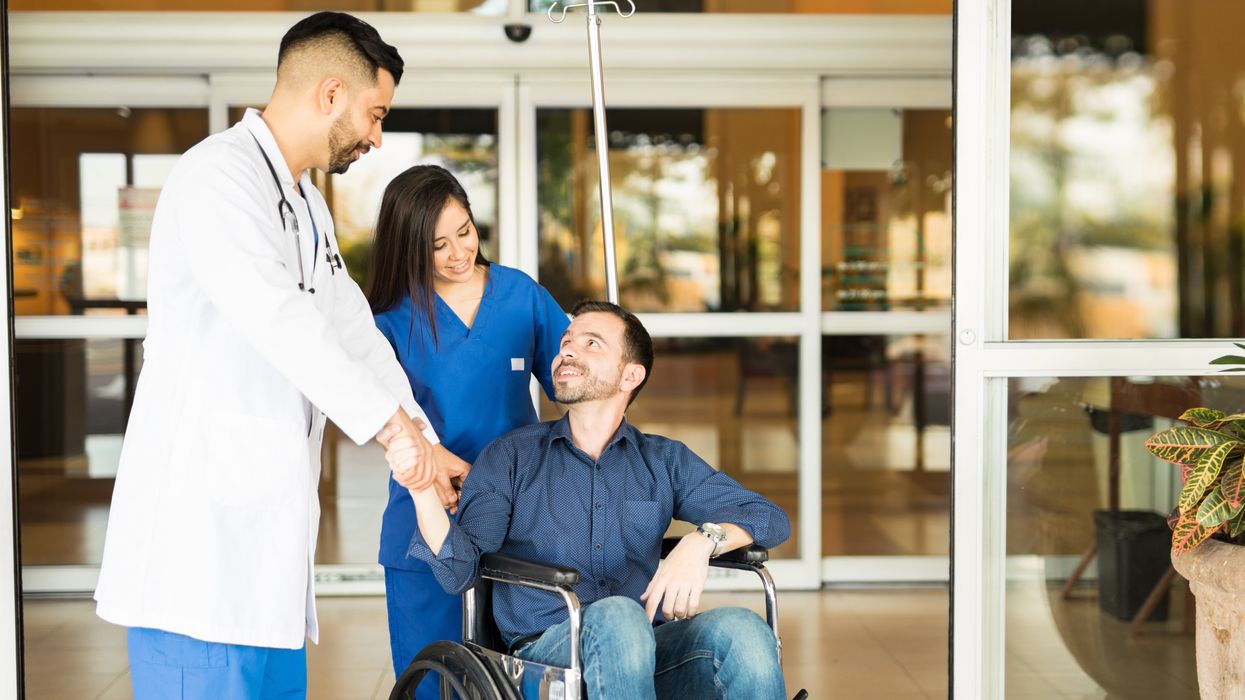When doctors couldn’t stop her daughter’s seizures, this mom earned a PhD and found a treatment herself.

Savannah Salazar (left) and her mother, Tracy Dixon-Salazaar, who earned a PhD in neurobiology in the quest for a treatment of her daughter's seizure disorder.
Twenty-eight years ago, Tracy Dixon-Salazaar woke to the sound of her daughter, two-year-old Savannah, in the midst of a medical emergency.
“I entered [Savannah’s room] to see her tiny little body jerking about violently in her bed,” Tracy said in an interview. “I thought she was choking.” When she and her husband frantically called 911, the paramedic told them it was likely that Savannah had had a seizure—a term neither Tracy nor her husband had ever heard before.
Over the next several years, Savannah’s seizures continued and worsened. By age five Savannah was having seizures dozens of times each day, and her parents noticed significant developmental delays. Savannah was unable to use the restroom and functioned more like a toddler than a five-year-old.
Doctors were mystified: Tracy and her husband had no family history of seizures, and there was no event—such as an injury or infection—that could have caused them. Doctors were also confused as to why Savannah’s seizures were happening so frequently despite trying different seizure medications.
Doctors eventually diagnosed Savannah with Lennox-Gaustaut Syndrome, or LGS, an epilepsy disorder with no cure and a poor prognosis. People with LGS are often resistant to several kinds of anti-seizure medications, and often suffer from developmental delays and behavioral problems. People with LGS also have a higher chance of injury as well as a higher chance of sudden unexpected death (SUDEP) due to the frequent seizures. In about 70 percent of cases, LGS has an identifiable cause such as a brain injury or genetic syndrome. In about 30 percent of cases, however, the cause is unknown.
Watching her daughter struggle through repeated seizures was devastating to Tracy and the rest of the family.
“This disease, it comes into your life. It’s uninvited. It’s unannounced and it takes over every aspect of your daily life,” said Tracy in an interview with Today.com. “Plus it’s attacking the thing that is most precious to you—your kid.”
Desperate to find some answers, Tracy began combing the medical literature for information about epilepsy and LGS. She enrolled in college courses to better understand the papers she was reading.
“Ironically, I thought I needed to go to college to take English classes to understand these papers—but soon learned it wasn’t English classes I needed, It was science,” Tracy said. When she took her first college science course, Tracy says, she “fell in love with the subject.”
Tracy was now a caregiver to Savannah, who continued to have hundreds of seizures a month, as well as a full-time student, studying late into the night and while her kids were at school, using classwork as “an outlet for the pain.”
“I couldn’t help my daughter,” Tracy said. “Studying was something I could do.”
Twelve years later, Tracy had earned a PhD in neurobiology.
After her post-doctoral training, Tracy started working at a lab that explored the genetics of epilepsy. Savannah’s doctors hadn’t found a genetic cause for her seizures, so Tracy decided to sequence her genome again to check for other abnormalities—and what she found was life-changing.
Tracy discovered that Savannah had a calcium channel mutation, meaning that too much calcium was passing through Savannah’s neural pathways, leading to seizures. The information made sense to Tracy: Anti-seizure medications often leech calcium from a person’s bones. When doctors had prescribed Savannah calcium supplements in the past to counteract these effects, her seizures had gotten worse every time she took the medication. Tracy took her discovery to Savannah’s doctor, who agreed to prescribe her a calcium blocker.
The change in Savannah was almost immediate.
Within two weeks, Savannah’s seizures had decreased by 95 percent. Once on a daily seven-drug regimen, she was soon weaned to just four, and then three. Amazingly, Tracy started to notice changes in Savannah’s personality and development, too.
“She just exploded in her personality and her talking and her walking and her potty training and oh my gosh she is just so sassy,” Tracy said in an interview.
Since starting the calcium blocker eleven years ago, Savannah has continued to make enormous strides. Though still unable to read or write, Savannah enjoys puzzles and social media. She’s “obsessed” with boys, says Tracy. And while Tracy suspects she’ll never be able to live independently, she and her daughter can now share more “normal” moments—something she never anticipated at the start of Savannah’s journey with LGS. While preparing for an event, Savannah helped Tracy get ready.
“We picked out a dress and it was the first time in our lives that we did something normal as a mother and a daughter,” she said. “It was pretty cool.”
Scientists use AI to predict how hospital stays will go
In this week's Friday Five, research on the best time to wrap up eating for the night, how to use AI to predict how hospital stays will go, a new way to armor the shields of our livers against cancer, super neurons in super agers - and much more.
The Friday Five covers five stories in research that you may have missed this week. There are plenty of controversies and troubling ethical issues in science – and we get into many of them in our online magazine – but this news roundup focuses on scientific creativity and progress to give you a therapeutic dose of inspiration headed into the weekend.
Here are the promising studies covered in this week's Friday Five:
- The problem with bedtime munching
- Scientists use AI to predict how stays in hospitals will go
- How to armor the shields of our livers against cancer
- One big step to save the world: turn one kind of plastic into another
- The perfect recipe for tiny brains
And an honorable mention this week: Bigger is better when it comes to super neurons in super agers
The Toxic Effects of Noise and What We’re Not Doing About It
Our daily soundscape is a cacophony of earsplitting jets, motorcycles, and construction sites. Engineers know how to eliminate and control noise, but other countries are ahead of the U.S. when it comes to keeping the quiet - with related health benefits.
Erica Walker had a studio in her Brookline, Mass. apartment where she worked as a bookbinder and furniture maker. That was until a family with two rowdy children moved in above her.
The kids ran amuck, disrupting her sleep and work. Ear plugs weren’t enough to blot out the commotion. Aside from anger and a sense of lost control, the noise increased her heart rate and made her stomach feel like it was dropping, she says.
That’s when Walker realized that noise is a public health problem, not merely an annoyance. She set up her own “mini study” on how the clamor was affecting her. She monitored sound levels in her apartment and sent saliva samples to a lab to measure her stress levels.
Walker ultimately sold her craft equipment and returned to school to study public health. Today she is assistant professor of epidemiology and director of the Community Noise Lab at the Brown University School of Public Health. “We treat noise like a first world problem—like a sacrifice we should have to make for modern conveniences. But it’s a serious environmental stressor,” she asserts.
Our daily soundscape is a cacophony of earsplitting jets, motorcycles, crying babies, construction sites or gunshots if you’re in the military. Noise exposure is the primary cause of preventable hearing loss. Researchers have identified links between excessive noise and a heightened risk of heart disease, metabolic disorders, anxiety, depression, sleep disorders, and impaired cognition. Even wildlife suffers. Blasting oil drills and loud shipping vessels impede the breeding, feeding and migration of whales and dolphins.
At one time, the federal government had our back… and our ears. Congress passed the Noise Control Act in 1972. The Environmental Protection Agency set up the Office of Noise Abatement and Control (ONAC) to launch research, explore solutions and establish noise emission standards. But ONAC was defunded in 1981 amidst a swirl of antiregulatory sentiment.
Impossibly Loud and Unhealthy
Daniel Fink. a physician, WHO consultant, and board chair of The Quiet Coalition, a program of the nonprofit Quiet Communities, likens the effect of noise to the invisible but cumulative harm of second-hand smoke. About 1 in 4 adults in the U.S. who report excellent to good hearing already have some hearing loss. The injury can happen after one loud concert or from years with a blaring TV. Some people are more genetically susceptible to noise-related hearing loss than others.
“People say noise isn’t a big deal but it bothers your body whether you realize it or not,” says Ted Rueter, director of Noise Free America: A Coalition to Promote Quiet. Noise can chip away at your ears or cardiovascular system even while you’re sleeping. Rueter became a “quiet advocate” while a professor at UCLA two decades ago. He was plagued by headaches, fatigue and sleep deprivation caused by the hubbub of Los Angeles, he says.
The louder a sound is, and the longer you are exposed to it, the more likely it will cause nerve damage and harmful fluid buildup in your inner ear. Normal speech is 50-60 decibels (dBs). The EPA recommends that 24-hour exposure to noise should be no higher than 70 weighted decibels over 24 hours (weighted to approximate how the human ear perceives the sound) to prevent hearing loss but a 55 dB limit is recommended to protect against other harms from noise, too.
The decibel scale is logarithmic. That means 80 dB is 10 times louder than 70 dB. Trucks and motorcycles run 90 dBs. A gas-powered leaf blower, jackhammer or snow blower will cost you 100 dBs. A rock concert is in the 110 dB range. Aircraft takeoffs or sirens? 120 dBs.
Walker, the Brown professor, says that sound measurements often use misleading metrics, though, because they don’t include low frequency sound that disturb the body. The high frequency of a screeching bus will register in decibels but the sound that makes your chest reverberate is not accounted for, she explains. ‘How loud?’ is a superficial take when it comes to noise, Walker says.

After realizing the impact of noise on her own health, Erica Walker was inspired to change careers and become director of the Community Noise Lab at the Brown University School of Public Health.
Erica Walker
Fink adds that the extent to which noise impairs hearing is underestimated. People assume hearing loss is due to age but it’s not inevitable, he says. He cites studies of older people living in quiet, isolated areas who maintain excellent hearing. Just like you can prevent wrinkles by using sunscreen, you can preserve hearing by using ear plugs when attending fireworks or hockey games.
You can enable push notifications on a Smart Watch to alert you at a bar exceeding healthy sound levels. Free apps like SoundPrint, iHEARu, or NoiseTube can do decibel checks, too, but you don’t need one, says Fink. “If you can’t carry a conversation at normal volume, it’s too loud and your auditory health is at risk,” he says.
About 40 million U.S. adults, ages 20-69, have noise-induced hearing loss. Fink is among them after experiencing tinnitus (ringing or buzzing in the ears) on leaving a raucous New Year’s Eve party in 2007. The condition is permanent and he wears earplugs now for protection.
Fewer are aware of the link between noise pollution and heart disease. Piercing noise is stressful, raising blood pressure and heart rate. If you live near a freeway or constantly barking dog, the chronic sound stress can trigger systemic inflammation and the vascular changes associated with heart attacks and stroke.
Researchers at Rutgers University’s Robert Wood Johnson Medical School, working with data from the state’s Bureau of Transportation, determined that 1 in 20 heart attacks in New Jersey during 2018 were due to noise from highways, trains and air traffic. That’s 800 heart attack hospitalizations in the state that year.
Another study showed that incidence of hypertension and hardening arteries decreased during the Covid-19 air lockdown among Poles in Krakow routinely exposed to aircraft noise. The authors, comparing their pre-pandemic 2015 results to 2020 data, concluded it was no coincidence.
Mental health takes a hit, too. Chronic noise can provoke anxiety, depression and violence. Cognitively, there is ample evidence that noise disturbance lowers student achievement and worker productivity, and hearing loss among older people can speed up cognitive decline.
Noise also contributes to health disparities. People in neighborhoods with low socioeconomic status and a higher percentage of minority residents bear the brunt of noise. Affluent people have the means to live far from airports, factories, and honking traffic.
Out, Out, Damn Noise
Europe is ahead of the U.S. in tackling noise pollution. The World Health Organization developed policy guidelines used by the European Environment Agency to establish noise regulations and standards, and progress reports are issued.
Americans are relying too much on personal protective equipment (PPE) instead of eliminating or controlling noise. The Centers of Disease Control and Prevention rank PPE as the least useful response. Earplugs and muffs are effective, says Walker, but these devices are “a band-aid on a waterfall.”
Editing out noise during product design is the goal. Engineers have an arsenal of techniques and know-how for that. The problem is that these solutions aren’t being applied.
A better way to lower the volume is by maintaining or substituting equipment intended for common use. Piercing building alarms can be replaced with visual signals that flash alerts. Clanking chain and gear drives can be swapped out with belt drives. Acoustical barriers can wall off highway noise. Hospitals can soften beeping monitors and limit loudspeaker blasts. Double paned windows preserve quiet.
Editing out noise during product design is the goal. Engineers have an arsenal of techniques and know-how for that. The problem is that these solutions aren’t being applied, says Jim Thompson, an engineer and editor of the Noise Control Engineering Journal, published by the Institute of Noise Control Engineering of the USA
Engineers have materials to insulate, absorb, reflect, block, seal or diffuse noise. Building walls can be padded. Metal gears and parts can be replaced with plastic. Clattering equipment wheels can be rubberized. In recent years, building certifications such as LEED have put more emphasis on designs that minimize harmful noise.
Walker faults urban planners, too. A city’s narrow streets and taller buildings create a canyon effect which intensifies noise. City planners could use bypasses, rerouting, and other infrastructure strategies to pump down traffic volume. Sound-absorbing asphalt pavement exists, too.
Some municipalities are taking innovative measures on their own. Noise cameras have been installed in Knoxville, Miami and New York City this year and six California cities will join suit next year. If your muffler or audio system registers 86 dB or higher, you may receive a warning, fine or citation, similar to how a red-light camera works. Rueter predicts these cameras will become commonplace.
Based on understanding how metabolic processes affect noise-induced hearing loss in animal models, scientists are exploring whether pharmacological interventions might work to inhibit cellular damage or improve cellular defenses against noise.
Washington, DC, and the University of Southern California have banned gas-powered leaf blowers in lieu of quieter battery-powered models to reduce both noise and air pollution. California will be the first state to ban the sale of gas-powered lawn equipment starting 2024.
New York state legislators enacted the SLEEP (Stop Loud and Excessive Exhaust Pollution) Act in 2021. This measure increases enforcement and fines against motorists and repair shops that illegally modify mufflers and exhaust systems for effect.
“A lot more basic science and application research is needed [to control noise],” says Thompson, noting that funding for this largely dried up after the 1970s. Based on understanding how metabolic processes affect noise-induced hearing loss in animal models, scientists are exploring whether pharmacological interventions might work to inhibit cellular damage or improve cellular defenses against noise.
Studying biochemical or known genetic markers for noise risk could lead to other methods for preventing hearing loss. This would offer an opportunity to identify people with significant risk so those more susceptible to hearing loss could start taking precautions to avoid noise or protect their ears in childhood.
These efforts could become more pressing in the near future, with the anticipated onslaught of drones, rising needs for air conditioners, and urban sprawl boding poorly for the soundscape. This, as deforestation destroys natural carbon absorption reservoirs and removes sound-buffering trees.
“Local and state governments don’t have a plan to deal with [noise] now or in the future,” says Walker. “We need to think about this with intentionality.”

